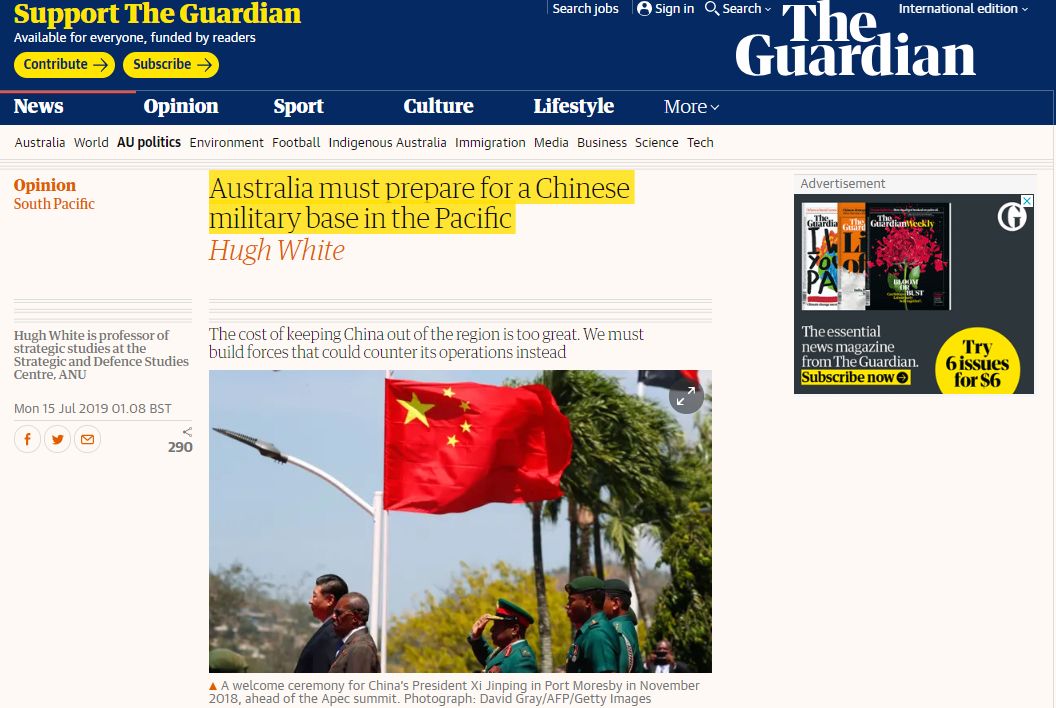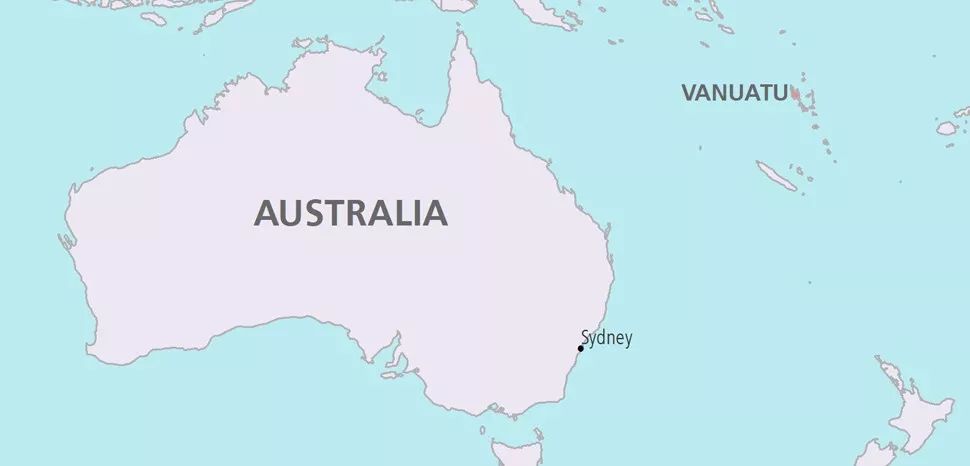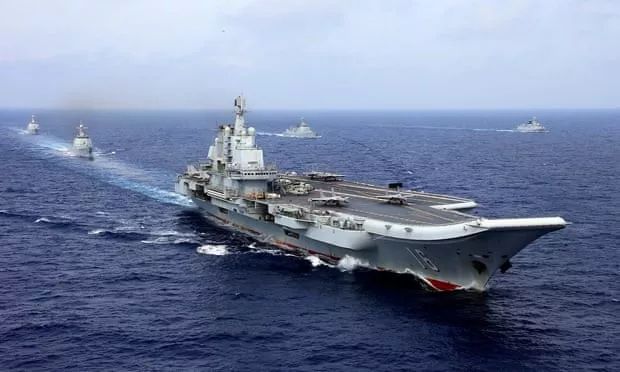
《卫报》7月15日刊登澳大利亚国立大学战略研究教授休·怀特文章《澳大利亚必须准备迎接南太平洋的中国军事基地》,节选自作者论文《否认事实:中国南顾,如何保卫澳大利亚》
文:Hugh White
译:范莉
说句实话,我们澳大利亚人对南太平洋上的邻国们其实从来都不怎么在乎。
澳大利亚北方和东北方向有一连串岛国,从巴布亚新几内亚、所罗门群岛一直延伸到瓦努阿图、斐济等地。尽管在地理位置上它们很靠近澳大利亚,但我们向来对它们没什么兴趣,也不觉得它们有什么重要之处或有利可图。
除了旅游业和少数例外情况,澳大利亚人对邻国奇妙的景观、丰富多元的文化以及当地百姓民生统统漠不关心,而且也不觉得和它们可以做什么贸易。
只有在战略意义上,澳大利亚才关注这些岛国:它们散布在澳洲大陆的北方,对保护我们免受军事攻击至关重要。这些邻国之所以对澳大利亚国防至关重要,就是因为它们离我们很近。
距离远近决定了军事行动的类型。是击沉军舰,炸毁机场还是占领城镇——以及采取各种行动相应的成本——取决于我军行动地点离我军基地有多远,以及敌军行动地点离他们的基地有多远。
在大多数历史时期,距离都是澳大利亚的优势。我们之所以安全,是因为我们位置偏远。但如果一个潜在的敌对大国能在靠近我国海岸的地方设置基地,并据此展开行动,那我们就丧失了距离优势。
中国为我们敲响警钟
去年四月有媒体报道称,中国寻求在瓦努阿图建立海军基地。时任澳大利亚总理的马尔科姆·特恩布尔回应道:“我们对在太平洋岛国和我们的邻国建立任何外国军事基地的做法深表担忧。”
中国和瓦努阿图方面都迅速并坚决地否认了这种说法,时任澳大利亚外长的朱莉·毕晓普也表态打消外界的疑虑。尽管这件事可能是虚惊一场,但澳大利亚政府似乎看到了可信的迹象,认为中国确实在积极寻求建立南太平洋军事基地。

中国在瓦努阿图设置军事基地的传言曾令澳大利亚深感不安
如果这件事真的发生,其重要性再怎么夸张也不为过。
自从日军在太平洋战争末期被赶出这些小岛以来,这将是第一次有不是澳大利亚盟友的国家寻求在距离我们这么近的地方建立军事基地。
在澳大利亚周边地区建立军事基地,能展现中国日益强大的军事实力和外交影响力,并且成本低、风险小。另外,届时华盛顿方面必然发声抗议,而中国则可以通过无视这种抗议向外界展示自己不惮于违逆美国。
到那一天,中国也等于向澳大利亚发出明确的信号,拒绝承认南太平洋为澳大利亚的势力范围,并且提醒我们以中国实力覆盖范围之广、能力之强,如果我们太高调地帮助美国或日本对抗中国,将受到中国的惩罚。
放弃势力范围
那么澳大利亚能做什么?
一个办法是彻底重构我们在南太平洋地区扮演的角色以及和其他国家的关系,将邻国牢牢置于我国羽翼保护之下。但更好的办法是退后一步,放弃御敌于南太平洋之外的传统国防观念。事实上,我们恐怕没有其他选择。
自从欧洲人定居澳大利亚以来,我们的政策框架都基于一系列战略假设,而如今后者史无前例地遭遇了来自中国的挑战。我们从来没有遇到过哪个亚洲国家像当下的中国这么强大,更不要说几十年后中国可能变得更强大。

2018年在西太平洋海域参与军事演习的辽宁舰
阻止中国进入南太平洋地区的代价是我们承受不起的。或者更确切的说,与其在和平时期阻止中国建立南太平洋基地,不如在战争时期通过封锁或袭击使这些基地失效,建设这种军事能力的成本可能反倒比较低。
如果选择发展军事力量以制衡可能出现在周边地区的军事基地,澳大利亚则不必对中国建立军事基地感到焦虑,无需再勉强维持长久以来我们认定必须守护的势力范围。
这并不意味着澳大利亚要全面放弃在周边地区的利益,或是任凭我们和邻国之间的关系继续疏远下去。相反,我们需要尽最大可能发挥作用,扩大存在感——但不是在周边地区建立排他性的势力范围,而是成为地区内主要的合作伙伴。
完全可以想象,这样一来,澳大利亚在积极参与南太平洋事务时,不试图排挤中国(或其他势力),而在恰当的方面与之合作,在必要时与之抗衡,以保护我们本国以及与周边小国共同的利益。
是时候把周边小国当作独立的国家来对待了。
当前的现实可能令澳大利亚感到不舒服,中国的实力远超我们历史上面对的任何地区强国,甚至远超我们的想象,在这样的国家面前维持南太平洋排他性势力范围是不可能的。如果这样做,可能越是试图排斥中国越会遭到失败,我们在南太平洋的影响力反而会越小。
如果澳大利亚总理斯科特•莫里森真的像他所说的那样,决心严肃对待南太平洋事务,那么他或许应该反其道而行之,先放弃专属势力范围,然后引导澳大利亚人改变以往的冷漠,对周边地区给予更多关注。

Australia must prepare for a Chinese military base in the Pacific
Let’s be honest: Australians have never had much time for our South Pacific neighbours.
The island nations that lie to our north and north-east, stretching from Papua New Guinea and Solomon Islands to Vanuatu, Fiji and beyond, may be close to us geographically, but we have not found them especially interesting, important or profitable.
With a few honourable exceptions, and tourism aside, Australians have been indifferent to our nearest neighbours’ dramatic landscapes, their rich and diverse cultures, and their general welfare, and we have seen relatively few opportunities for trade.
Only their strategic significance has attracted us: the islands scattered widely across the north of our continent are critical to our protection from armed attack. Our closest neighbours are crucial to the defence of our continent simply because of their proximity.
Military operations are governed by distance. Whether you can sink a ship, bomb an airfield or seize a town – and, critically, how much it will cost – depends on how far your forces must operate from their bases and how far the enemy must operate from theirs.
For much of our history, distance has worked to Australia’s advantage. We have been secure because we are remote. But we lose this advantage if a potentially hostile great power can operate from bases close to our shores.
The China wake-up call
“We would view with great concern the establishment of any foreign military bases in those Pacific Island countries and neighbours of ours.” That was then prime minister Malcolm Turnbull in April 2018, responding to press reports last April that China was seeking to build a naval base in Vanuatu.
The story was swiftly and categorically denied by both Beijing and Port Vila, and Julie Bishop, then minister for foreign affairs, poured cold water on it. While it may prove a false alarm, it seems Canberra has received credible indications that China is indeed actively seeking a military base somewhere in the South Pacific.
It would be hard to overstate the significance of such a development, were it to occur.
This would be the first time since Japan was pushed out of the islands at the end of the Pacific War that any major power, other than one of our allies, has sought a military base so close to Australia.
Establishing a base in our neighbourhood would be a low-cost, low-risk way for China to show off its growing military and diplomatic reach and clout. Moreover, by ignoring the noisy complaints that would surely emanate from Washington, Beijing would show that it is willing to defy the United States.
And it would send an unambiguous message to us here in Australia, signalling Beijing’s rejection of our claims to our own sphere of influence in the South Pacific, and sending a stark warning of China’s reach and its capacity to punish us if we side too vociferously with the US or Japan against it.
Abandoning the sphere of influence
What can Australia do, then?
One option is a radical recasting of our relations and role in the South Pacific, to draw our neighbour much more closely under our wing. But the better option would be to step back, abandoning our traditional ideas about keeping intruders out of the South Pacific. In fact, there may be no alternative.
China poses an unprecedented challenge to the strategic assumptions that have framed our policies since European settlement. We have never encountered an Asian country as powerful as China is now, let alone as powerful as it will likely become in the decades ahead.
The costs to us of trying to keep China out of the region might simply prove impossible to bear. Or, to be more precise, it might prove cheaper to build military capabilities that in a war could neutralise Chinese bases in the South Pacific (by denying access to them and subjecting them to strike attacks) than to prevent China from establishing such bases in peacetime.
Building forces that could counter Chinese bases in our neighbourhood would mean that we could feel less anxious about the establishment of such bases, and relax the imperative to preserve the sphere of influence we have for so long assumed we must maintain.
This would not mean abandoning all interest in our nearest neighbours and succumbing to the indifference that has historically weakened our relationships with them. On the contrary, we should make great efforts to maximise our role and presence – not in the form of an exclusive sphere of influence, but as one of the region’s major partners.
It is possible to imagine Australia actively engaged in the South Pacific not to exclude China (or any other power), but to work with it where possible, and to work against it where necessary, to protect our interests and the interests we share with our small neighbours as best we can.
We should start to treat our smaller close neighbours as independent at last.
The uncomfortable reality is that preserving an exclusive sphere of influence in the South Pacific is not going to be possible against a regional power that is far stronger than any we have ever confronted, or even contemplated. It might turn out that the more we try and fail to exclude China from the South Pacific, the less influence we will have there.
If Scott Morrison is as serious about the South Pacific as he claims, he should start, paradoxically perhaps, by abandoning the idea of an exclusive sphere of influence, and then by guiding Australians to take a much greater interest in our neighbourhood than we ever have before.


